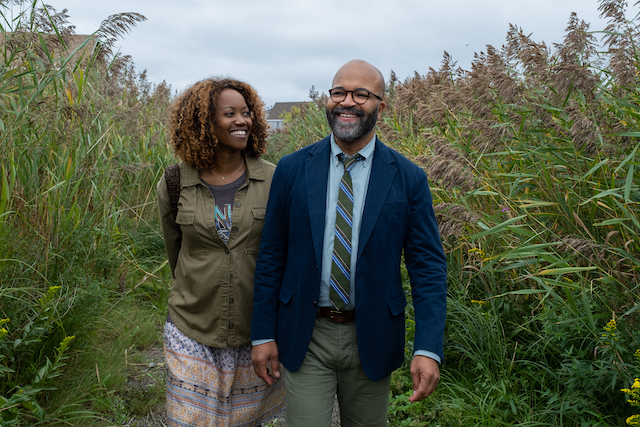
Synopsis : American Fiction is Cord Jefferson‘s hilarious directorial debut, which confronts our culture’s obsession with reducing people to outrageous stereotypes. Jeffrey Wright stars as Monk, a frustrated novelist who’s fed up with the establishment profiting from “Black” entertainment that relies on tired and offensive tropes. To prove his point, Monk uses a pen name to write an outlandish “Black” book of his own, a book that propels him to the heart of hypocrisy and the madness he claims to disdain.
Rating: R (Some Drug Use|Brief Violence|Sexual References|Language Throughout)
Genre: Comedy, Drama
Original Language: English
Director: Cord Jefferson
Producer: Ben LeClair, Nikos Karamiginos, Cord Jefferson, Jermaine Johnson
Writer: Cord Jefferson
Release Date (Theaters): Limited
Runtime:
Distributor: MGM
Production Co: Orion Pictures, T-Street, MRC, 3Arts
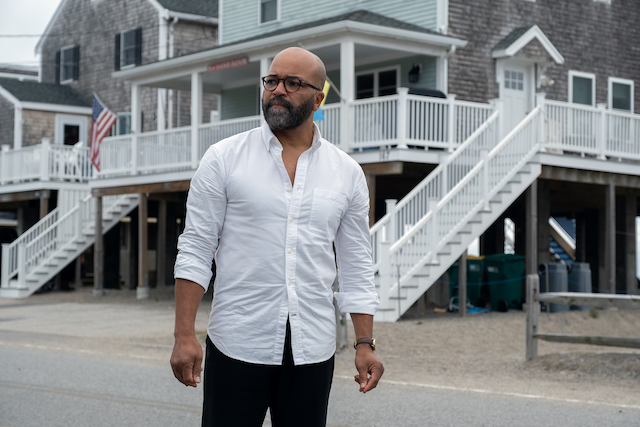
AMERICAN FICTION An Orion Pictures Release Photo credit: Claire Folger © 2023 Orion Releasing LLC. All Rights Reserved.
Press Conference with Writer/Director CORD JEFFERSON, Actors JEFFREY WRIGHT, TRACEE ELLIS ROSS, JOHN ORTIZ, ERIKA ALEXANDER, ADAM BRODY, and STERLING K. BROWN
Q : Let’s get down to our business of order. The cast and filmmakers of American Fiction. So, I would like to start with the cast first and find out from you guys, starting first with Mr. Jeffrey Wright, what gave you the confidence, and what led you to want to be a part of this project that was written and directed by first-time filmmaker Cord Jefferson? What made you say yes, and what gave you the confidence to go?
JEFFREY WRIGHT : The confidence to go. Cord sent me a wonderful invitation to this project. He sent me the script along with the letter, saying that he had read the novel, and written the script, and very early on heard my voice in his head as his character. I did apologize to him for that. ‘Cause I know how tricky that can be. And he also said, “And I have no Plan B.” So that was pretty flattering.
And then when I read it, the membrane between my life and that character’s life was infinitesimally thin. And it wasn’t really a matter of confidence. It was kind of a necessity. I just said, yeah, I can tell this story. I know this man’s journey. Particularly his relationship to the family.
The necessity of becoming caretaker to she who was his caretaker. That was a very close experience, one that I knew probably too intimately. And I think Cord can speak to that as well. But there were just a number of overlaps. The script was so finely tuned. The satire, the irony. I understood the music, and I hopped on board.
Q : And for you, Miss Ross?
TRACEE ELLIS ROSS : Without just doing my best, to be brief, the material of the script was incredibly written. I was drawn in from the first moment. Cord, everybody says he’s a first-time director, but he’s not a first-time human. And he’s just a substantial person that is incredibly intelligent. I’m gonna talk about you while you’re here.
Incredibly intelligent, and really clear and strong point of view. But doesn’t have ego. Which is a very unique and special thing that lends itself beautifully to a director who gives his actors space, but also knows what he wants.
But on the page, it was extraordinary. And the character itself, this role, I’ll just quickly say, the fact that she was a Planned Parenthood doctor was very interesting to me. The fact that she was holding this space in the family, and filling in the gaps that so many Black women do in the world, and to give life to that woman was really important to me. And working with Jeffrey Wright. Did I say it loud enough, Jeffrey Wright. That really got me. That was my briefness.
Q : Sterling.
STERLING K. BROWN : I was thinking about Cord and his sort of like not having a Plan B. And if I was Cord, sometimes I imagine myself playing the part of Cord Jefferson and trying to figure out how I would cast this thing. I was like, who is light-skinted enough? Right? But also has short-enough hair, who doesn’t wear socks all the time? I was like, “Jeffrey Wright.” Jeffrey Wright reminds me of me. Anyway.
JEFFREY WRIGHT: The irony is, I see myself as Blue Black [phonetic] internally.
STERLING K. BROWN : Come on, man. I love that. I love that. Listen, listen. What gave me confidence in it is the script, like everyone else has said, and the desire to put that story out into the world.
The desire to expand how the media can see us, because sometimes it has been more narrowly defined. To see the banality and normalcy of people dealing with day-to-day troubles who happen to look like us. And the idea that it was written so well, because I think I never underestimate the power of a story well-told, and the fact that it gets to be populated with people with melanin makes me really excited. And then hopefully it’ll make money, and then we get a chance to make more of them.
Q : All right, Miss Erika Alexander.
Erika Alexander : I was really honored to be invited to it by Cord Jefferson who laid out what he wanted to do, why he saw me in the role. And it’s really nice to go where you’re invited. Where you don’t have to prove what you’ve done. You don’t have to convince anybody.
That they’re already seeing you in a place, standing next to people not only that you admire, that you aspire to, that you really are rooting for in life, and hopefully they’ve been rooting for you. And that’s been my whole experience. So, I’m really grateful for this. And I think that America, I love that it’s called American Fiction. Because we’re all living in a fiction of some sort. And we need to start telling more truths. So, I’m really glad to be here.
Q : All right, Sir John.
JOHN ORTIZ : Yeah, the script, which I read before I was officially invited, and after reading it, hands-down, I told my manager this is the best screenplay I’ve ever read. And then I heard that he was interested in me playing the role of the agent. And that was refreshing for me. And I was like, I really want to do it. And then I met him, Cord, and that gave me the confidence.
Because not only did I feel seen. Seen. But I understood his connection to the material. I understood his passion for the material. For the story. I understood his care as he was showing me drawings of Arthur’s desk. And I was like, “It’s just a desk.” [laugh] He’s like, “No, it’s not just a desk. This is like Arthur’s Desk.” You know?
And I was like, “All right. All right. I like this guy.” You know? And to me, that’s what it’s all about. It’s about, at the end of the day, the personal. And when the personal is rooted in the way that I felt, it was rooted with Cord and this story, I was all in.
Q : And for you, Adam?
Adam Brody : Like most actors, I’ve been a long-term Jeffrey Wright fan. And so, first and foremost, an opportunity to have a few scenes one on one with him was very exciting for me. I thought the script was very funny, very intelligent, very touching. I was very curious to see how these two seemingly very different storylines co-existed with each other.
And let’s see, I showed up in Boston. I met Cord and Jeffrey that morning on set. I was done by lunch. And here I am. [laugh] With all these wonderful actors I admire. It’s been pretty great ride for me.
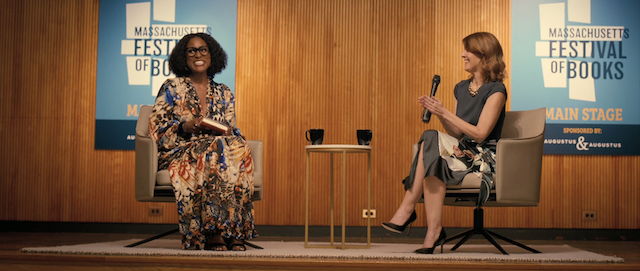
AMERICAN FICTION An Orion Pictures Release Photo credit: Courtesy of ORION Pictures Inc. © 2023 Orion Releasing LLC. All Rights Reserved.
Q : Can we please show some love for Leslie Uggams? Because like I said, I don’t even come up with the concept to create celebration of Black cinema if it wasn’t for someone like a Leslie Uggams.
JEFFREY WRIGHT : Well, I told her on the last day, after we’d finished working together, I was in the hair and makeup trailer, and I said to her, “I have something that I must tell you. Since the very first time that I laid eyes on you mother, I had had a crush on you. [laugh]”
TRACEE ELLIS ROSS: [laugh]
Q : I’m so happy you saved it.
JEFFREY WRIGHT : I saved it.
Q : Saved it.
JEFFREY: So as not to distract her working process.
Q : Kept that in your back pocket.
JEFFREY WRIGHT : But we had a conversation the other day, you know, about some of the issues that are raised in the film, some of the issues that we face in terms of representation and the ways in which we respond to them. And are we or are we not limited by those? And I realized we were there with Leslie Uggams. Who is one of those who marched on the figurative Washington, in terms of our industry. You know, going back to Bert Williams. And you crossed through Leslie Uggams. And Leslie told me that her career really started by winning the talent show at the Apollo when she was 14 or 15 years old or something like that.
So, her journey is seminal to our journeys. You know, we stand on her shoulders. And she is an absolute beautiful, generous collaborator, artist. She was thrilled to be there. And I’ll tell a quick story about what type of artist she is. We were filming the scene. You all have seen it by now, I’m assuming. On the beach. And it was late September in Scituate, about 45 minutes Southeast of Boston. Gorgeous little harbor town. Little fishing village down there.
Anyway, it was late fall, or mid-fall. So, it wasn’t warm. It was cold. And she’s out there, you know, practically barefoot. Housecoat and all of that, walking. And just going back and forth and I’m down on the water with her. And I’m super concerned for her health, “Do you think we can get one more?” She says, “Yeah. Of course. We’re shooting a movie. Like, roll the camera, Son.”
And remember your lines. But, I mean, she was just so committed. So clear. And just an old pro. And yeah. My thanks to her for being a part of this. But also, for all that she has allowed us to do in our careers.
Q : What led you to this journey? Why did you decide to choose this particular novel, Erasure? That was written by Percival Everett. And then, how were you able to adapt it and be able to direct this film?
CORD JEFFERSON: Oh, so, before I worked in film and television, I was a journalist for about a decade.
Q : What? You were a journalist?
CORD: Yeah. Yeah. Yeah.
Q : Oh, so, you’re telling the audience they better come with it with the questions.
CORD JEFFERSON : Yeah. [laugh]
Q : Journalist versus journalist.
CORD JEFFERSON: Well, I don’t know. Well, I mean, I’m out of practice. I haven’t been a journalist for a while. So, don’t come with it that hard with the questions.
So, out of college, I started working as a freelance journalist. And I sort of worked in all capacities as a journalist. But toward the end of my career, I was working at Gawker. I was there from 2012 to 2014. And toward the end of my career. I published this article in 2014, at the end of my journalism career called the Racism Beat.
And it was about how I had reached this place in my career when, you know, like, weekly somebody would come to me and they would say, “Do you want to write about Trayvon Martin being killed? Do you want to write about Breonna Tayler being killed? Do you want to write about Mike Brown being killed? Do you want to write about this racist thing that somebody said about President Obama?” And it just felt like this revolving door of misery constantly. Like, that’s what my job had become, was to sort of dissect the latest violent tragedy in the Black community. And it felt like, A, that is sort of uninspiring for me on a creative level.
But then B, it was also, like, what can I write about this that hasn’t been written about this hundreds of times before? Right. What can I write about this situation that wasn’t written by Fredrick Douglas and people, like, literally centuries ago? And sort of like as if I needed to write something new about it. You know, it’s difficult to try to come up with something for every new, sort of like, tragedy. And so, I was excited because when I got into film and television, it felt like great, I’m no longer beholden to the realities of the world. We can write Black people in space. We can write about Black people riding unicorns. We can do anything that we want to. It’s sort of like, anything that we can dream up, we can write. And lo and behold, it wasn’t long before people came to me and they were like, “Do you want to write a movie about this Black teenager being killed by police?”
And it was like, do you want to write a movie about slaves? Do you want to write a movie about gang members? Do you want to write a movie about drug dealers. And it just felt like, oh, even in the world of fiction, there is such a severe limitation to what people think Black life looks like. Even in the world of fantasy, where we can do anything, there’s still such a limited perspective of Black life. And, you know, it’s painful on a sort of creative level. And it’s sort of obviously frustrating as somebody who wants to make work. But also, it’s painful because the implication there is that Black life does not have the breadth or depth of everybody else’s life.
It’s sort of like we are defined by these five or six stories that we tell over and over again. Largely that are about, sort of like, our ability to withstand pain and violence and suffering. And to me, it’s like, you know, yes, I’ve had bad interactions with police officers. That has happened in my life. But it doesn’t happen often. And when it does happen, it’s the least interesting thing that’s happened to me that day. Right, ‘Cause it says nothing about who I am as a human being. Sort of it says everything about the person who’s harassing me.
It sort of is nothing about my humanity or my identity. And so, you know, these are the things that were swirling around in my mind when I picked up the novel Erasure. And it was dealing with these themes. And besides just those professional themes of what it means and sort of like the restrictions that people put on Black writers, you know, I have two older brothers. You know, I really understand the sibling dynamic that was being represented in the book. ou know, we have a very overbearing father figure. Who I love but who looms large. And he was on set so these people can speak to that. Yes, he was.
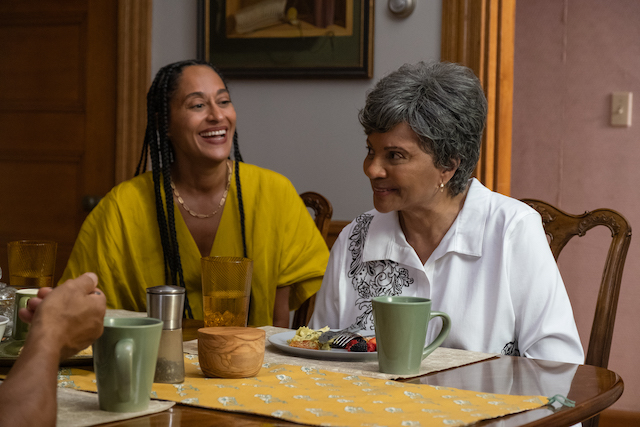
AMERICAN FICTION An Orion Pictures Release Photo credit: Claire Folger © 2023 Orion Releasing LLC. All Rights Reserved.
Q : Has your dad heard you talk about him? I’m just wondering. ‘Cause you say this every time.
CORD JEFFERSON : Yes, he was. Oh, yeah. But, so, that sort of made sense. My mother didn’t die of Alzheimer’s. But my mother died of cancer about eight years ago. And when she was first sick, you know, like Lisa in the film, my oldest brother was living in our hometown.
And he was the one who took the responsibility of taking care of her and shopping for her and taking her to her appointments. And, you know, then I moved home at a certain point in time for the end of her life. To help take care of her. So, there was just all these things that I think that in order to make an adaptation that feels like there is some sort of like passion to it, and not just kind of a bloodless sort of money grab, it feels like the key is kind of to find what you identify with in the material. Like, what really speaks to you?
And there was so much in the novel that was speaking to me that it felt like oh, this makes perfect sense for an adaptation for me. Because you know, I’d never directed anything before this film. And, you know, that terrified me because, you know, I would talk to people and I said, “Well, you know, I don’t know anything about lenses. I don’t know anything about lighting. There’s all these technical things that I don’t understand.” And then my friend would say, “You know, you just need to have a vision, and you can articulate that vision to other people who understand those things.” And so, understanding the material at a fundamental level is what really gave me the courage to move forward.
‘Cause I felt like even if I don’t know these technical things, necessarily, like, I understand the story. I understand these people. I understand the story that we’re trying to tell. And so, as long as I use that as my road map, then I can sort of always go back to that in order to make these other decisions that I know less about. But I knew this in my bones.
Q : Miss Ross, about this film does such a beautiful job of creating this family dynamic. Something that you’ve rarely seen portrayed with a Black family in film. Not that you’re an expert of family dynamics, ‘cause you’ve done such a good job of that on television. But on film, it’s a different. But talk about what it was like to sort of recreate that along with Jeffrey and along with Sterling.
TRACEE ELLIS ROSS : You know, it was interesting. We did not work together at all.
STERLING K. BROWN : Yeah.
TRACEE ELLIS ROSS : Which was fascinating.
STERLING K. BROWN : You left as I was coming.
TRACEE ELLIS ROSS : Yeah. But there was a dynamic that was on the page.
STERLING: By sister.
TRACEE ELLIS ROSS : And I also think the three of us come from family dynamics of siblings. That’s so interesting. I don’t know. But the dynamics of being a sibling, and being a middle sibling is so specific.
STERLING K. BROWN : Yeah.
TRACEE ELLIS ROSS : And the roles that you play in your family system. And I think that was written on the page. But it was also really important to me that that was the history that we were giving in the moments that we were together.
That there was a real rapport. There’s something that happens with your siblings that’s just unspoken. There’s a way you know each other and way that you speak to each other that you don’t speak to anybody else that way. And I felt like that was there. I don’t know, do you wanna speak any more to that?
STERLING K. BROWN : I agree. I’m the youngest of three. So, it comes very easy to me to be annoying, to be sort of delightfully entertaining.
TRACEE ELLIS ROSS : That is the baby dynamic.
STERLING K. BROWN : That is the baby dynamic or whatnot. And I think also, for you, in terms of being the one who stayed, and then these two brothers being the one that left. Like, also there’s the idea, like, the women usually tend to be the ones that sort of, like, take on that role of caretaker or whatnot. And then, you’re sort of the tie that binded [sic] us.
TRACEE ELLIS ROSS : Societally assigned.
STERLING K. BROWN : Societally assigned, but you’re also sort of the bridge between the two of us. And now that you’re gone, we have to find a way to sort of connect with one another. So, yeah.
Q : Jeffrey, how do you feel the character of Monk has impacted you personally? He’s such a realistically flawed person that wants to be recognized to a fault. But is also appreciative and loyal to his family and friends.
JEFFREY WRIGHT : Did you just read my biography?
ALL: [laugh]
JEFFREY WRIGHT : You know, I guess we’re still very much in the process with this film. You know, we made it a little over a year ago now. But the process isn’t complete. The circle isn’t drawn until audiences receive it. So, you know, I’m still on the ride. But it is one of those wonderfully strange things that happen often when we work, when perhaps we are doing what we were supposed to be doing.
When there’s so much overlap between his life and mine, in ways that I care not to divulge too terribly. But I don’t know. I think in terms of how it’s changed me, it remains to be seen.
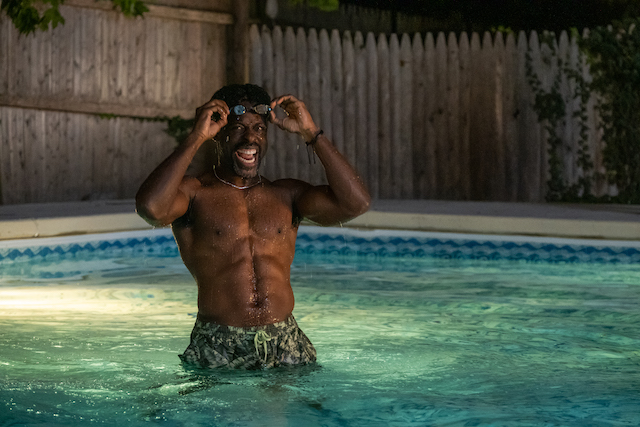
An Orion Pictures Release Photo credit: Claire Folger © 2023 Orion Releasing LLC. All Rights Reserved.
Q : So much of the film speaks true to being a Black creative trying to break into the industry, especially the ones who don’t want to be pigeonholed or be pigeonholed themselves. What from your own experience as a Black artist made you go, quote, I have to put this into a screenplay, quote.
CORD JEFFERSON : Oh, I mean, so much. Three months before I found this novel, I had received a note from an executive that I needed to make a character in a script that I wrote blacker. And that came through an emissary, and I told the emissary, I said, “I will indulge that note if you tell that executive who gave you that note to sit down in front of me and tell me what it means to be Blacker.” And that note went way, ‘cause I’m sure that they knew they were about to commit a civil rights violation, If they were to have that meeting. Two years ago, I have a really close friend who, a couple years ago, she’s a Black journalist, and she has been trying to make her way in film and television.
And she flew to Los Angeles to take meetings with production companies. And she sat down with this production company and they said, “What are you interested in writing?” And she said, “Well, I’m a child of the ‘90s. I’d really liked to write an erotic thriller.” She said, “I really like romcoms. I’d love to write a romcom.” And they said, “Okay. Let us think of some things and we’ll get back to you soon.” And she said great, and she left their office, and they called her about three hours later. And they said, “We’ve got a great idea for you. We think we found it.” And she said, “Okay, what is it?” And they said, “It’s a story about a blind slave named Blind Tom.” “And thanks to a wealthy White benefactor, he learns to play the piano and he becomes this piano prodigy.” And she said, “That’s a weird erotic thriller. That is a weird premise for a romcom.”
TRACEE ELLIS ROSS : Romcom. That is one neat romcom.
CORD JEFFERSON : Yeah. That’ll be a strange erotic thriller turn, if Blind Tom becomes the erotic thriller.
JEFFREY WRIGHT: Historical. No, he was.
CORD JEFFERSON : Oh, no. He was. He definitely was. No, it’s a true story.
JEFFREY WRIGHT : It was, like, the biggest selling, like, musical artist of his time or something.
CORD JEFFERSON : Yeah. Jeffrey knows that because I took that project. I mean, that’s our next [thing?].
ALL: [laugh]
CORD JEFFERSON: I was like, that’s fucked up. They shouldn’t say that to you. Yeah.
Q : But real quick, now that we’ve gone in the direction.
CORD JEFFERSON : That’s all just to say that you know, that was two years ago, the person telling me to make the person in my script Blacker was three years ago. You know, this wasn’t 50 years ago. This was during the time of covid. So, you know, the people are like, “Oh, yeah, it’s a satire.” And yes, it is a satire. There are sort of, like, moments of exaggeration. But not that much, you know? That’s stuff that could easily have gone into the film and sort of worked with the story that we’re telling.
So, you know, I think that people think that this is, you know, it is not far off the mark. I’ll say that. There is a lot of me in the movie. There’s a lot of my personal experience. There’s just sort of, like, me all over the place. And I’ve dealt with this a lot in my career, as I’m sure a lot of other people do.
Q : Now, I’m glad you touched on the satire aspect, ‘cause I was gonna ask a question about that and go deeper. But we don’t have a lot of time for that, so I think you alluded to that with the answer to that question. But one thing I wanna touch on before we do get to our last question from the audience is, I do wanna ask Erika and Jeffrey to touch on how they worked together as a couple on this film to make Black love look so authentic and real in this film. You first, Erika.
ERIKA ALEXANDER : I wore some body butter.
ALL: [laugh]
ERIKA ALEXANDER : I borrowed Sterling’s from his abs.
STERLING: Stay moisturized. We stay moisturized.
ERIKA ALEXANDER : Yes. You know, the is, it’s easy to love Jeffrey Wright. So, I’m talking about the character Monk, who’s a little bit more difficult to love. But if you remember, Coraline met him before she met the actual man, because she read his books. And so, he’s already seduced her in some way. And so, I think that I had to remember that, even though I get to learn who he is.
ERIKA ALEXANDER : And I love that they do meet cute. She drops the vegetables and he comes to pick them up. And they talk over wine and that type of thing, and they get to know each other. It’s a very mature relationship. And that shouldn’t be an act of resistance to see that type of thing, but it is. And Jeffrey, he’s an interior guy, and so is Monk. And so, you don’t wanna do too much, because I think a lot of what they do is unsaid.
ERIKA ALEXANDER : They’ve lived a life. She’s come from a divorce. She’s a public defender, so she’s, you know, accomplished. But she’s trying it out and she, I think, is willing to take a risk on, you know, maybe a new relationship, but he has to meet her there truthfully. And I think that that matters. It’s a beautiful, you know, conversation on set, because it just happened sort of naturally, and we didn’t really talk about it.
JEFFREY WRIGHT: Well, I’ve been an admirer of Erika since the public theater. I mean, Erika just has so many qualities. You know, the humor, the irony, but also this strength about her that is very alluring. And for this piece, just perfectly suited. So, as she described, Monk, you know, he holds his cards to the vest. He’s a bit introverted. And but I liked that she had these qualities to bring him out. But also, in the course of events of course, to push him away. There was a strength there. Kind of an old-school, I mean, I think the actor that comes to mind is Patricia Neal, who had that kind of, you know, forcefulness about her, as well as beauty.
And so, you know, again, we had an incredible group of actors here. Not only the incredible actors that are seated here, but the guy who plays Ned in the bookstore. I mean, everyone, to the smallest detail, was just wonderfully suited. So really, what we did, Erika and I, as we all did, was we just got together and the camera rolled. And we looked at one another and we did out work. It was just a fantastic, fantastic collaborative circle that Cord created for us.
Check out more of Nobuhiro’s articles.
Here’s the trailer of the film.

